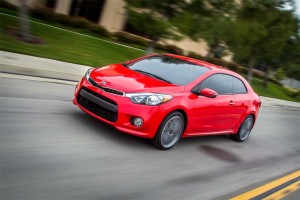
The new plant is expected to produce several small models, including a version of the Kia Forte Koup.
Desperate to add more much-needed production capacity, Kia Motors will become the latest automaker to open a new assembly plant in Mexico.
Intended to serve markets up and down the Americas, the $1 billion plant will begin operations in just two years, and will be tooled to eventually build as many as 300,000 vehicles annually. The facility is expected to produce a number of different compact models, according to the Korean carmaker, though it did not identify specific plans yet.
The factory will become one of a growing list of automotive assembly plants operating in the Spanish-speaking country, Mexico already on target to become the sixth-largest auto-producing nation in the world as makers such as Nissan, Audi and now Kia set up shop or expand existing production facilities.
“Having the option of investing in any country, a transnational company as prestigious as Kia Motors chose Mexico,” Mexican President Enrique Pena Nieto said during an announcement in Mexico City alongside Kia Vice Chairman Lee Hyoung-Keun. “This shows the confidence global investors have in the present and future of Mexico.”
(Click Here to check out the new look of the Kia Sorento.)
Like its sibling brand, Hyundai, Kia has been running short of capacity as its global sales have rapidly increased in recent years. When the new Mexican plant is operating at full speed, the smaller of the two marques will have the capacity to produce 1.68 million vehicles outside South Korea each year, almost the same as its 1.69 million home market capacity.
Industry analysts expect Kia to produce at least two existing models in Mexico: the Forte compact and Rio subcompact, both relatively low-margin products currently produced only in Korea.
Mexico will offer Kia even lower wages than at its Korean plants – where labor costs have been rising rapidly. But like its competitors, Kia is believed to also have been attracted to the Latin American nation by its extensive free trade agreements which make it easier and less costly to ship vehicles around the world.
“Mexico is well-known for its skilled, low-cost labor force and numerous free trade agreements (such as NAFTA) with about 40 countries,” the maker explained in a statement.
That should help it in targeting markets as diverse as the U.S. and Brazil, products built in Mexico expected to replace those currently exported from Korea. But Kia also wants to access the small but growing Mexican market itself. That has been difficult, until now, because of high Mexican tariffs on Korean-made vehicles.
(Kia Soul tops list of must-have city cars, says new study. Click Herefor the full results.)
Long known for bland vehicles targeting entry-level segments, Kia has been engaged in a rapid transformation. It hired former Audi chief designer Peter Schreyer to run its own styling studio and has been developing a new reputation for exciting exteriors, while also moving up-market with products such as the new, full-size K900 luxury sedan.
That’s a strategy similar to the one that has proved effective for its bigger sibling Hyundai – which has reportedly also been considering Mexico for a new production plant. Both of the Korean makers currently have pushed production to the limits at their existing assembly plants in the United States.
Kia currently produces some vehicles for Hyundai at its West Point, Georgia factory. With Hyundai also looking for more capacity, some are speculating it may also lend a helping hand in Mexico. But Jim Trainor, Hyundai’s U.S. spokesman, said in an e-mail, “The plant is being built and operated by Kia. We have no comment on the plant.”
(New car buyers less satisfied with their vehicles for second year in a row. Click Here for the story.)
While Hyundai and a number of other automakers have used the cost advantages of Mexican production to target entry-level models, Mexico has recently seen a surge of interest by luxury manufacturers, as well. BMW and Mercedes-Benz have both this year announced production plans, the latter intending to build an assembly line alongside one now operated by its alliance partner Nissan. Audi, meanwhile, is building its own factory about an hour’s drive from one long operated by parent maker Volkswagen.

THE AMERICAN AUTO BUYER IS STUPID. CAE AT HAND:
KIA WHICH ADVERTISES TO THE EXTENT THAT THEIR COFFERS ARE LINED WITH GOLD AND SELLING ONLY BECAUSE IDIOTIC ADVERTISING, THUS MAKING A HUGE PROFIT IN OUR US$ AND THEN HAS THE NERVE TO OPEN
A ONE BILLION PLANT IN MEXICO WHEN OUR UNEMP-
LOYMENT IS SO HIGH. I WILL NOT BUY KIA AND HYUNDAI AND I AM A KOREAN WAR DISABLED VETERAN.
Paul, not to defend Kia, but recall:
1) They also opened an American assembly plant in Georgia
2) They are just one on a Who’s-Who list of automakers operating in Mexico. Finding a maker that hasn’t set up a plant there has become difficult. (Hyundai, among the few, but it is considering a Mexican option.) If you were to not buy from a manufacturer operating in Mexico, or now planning a plant there, you’d have a very hard time buying a new car.
Paul A. Eisenstein
Publisher, TheDetroitBureau.com
In America consumers are free to vote with their wallet and I hope they do so wisely.
Ultimately, the issue is: can companies survive in the long term if they keep reducing the number of potential consumers of their products? Those Mexican workers are not making enough to buy what they make.